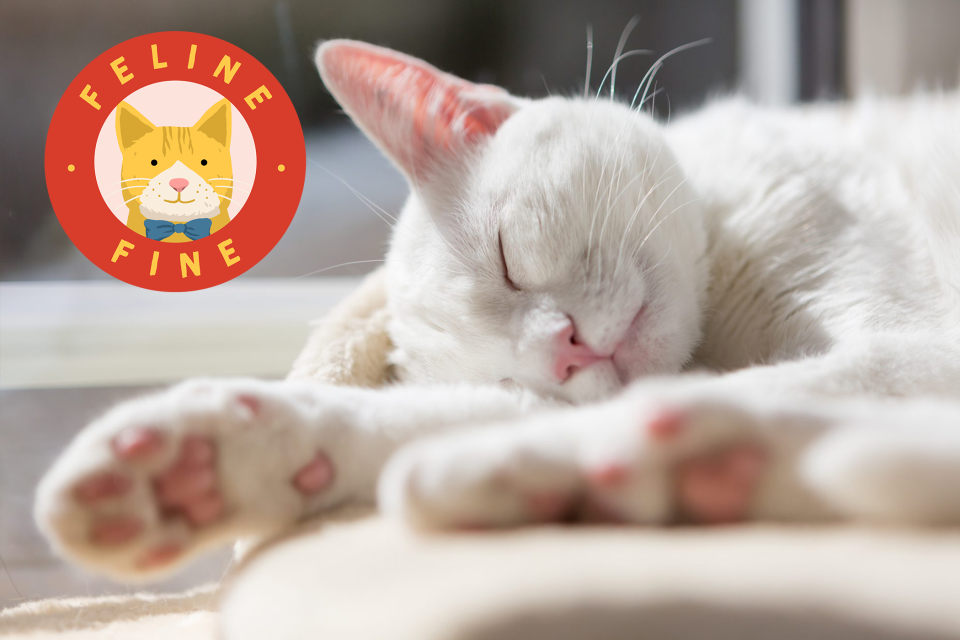We Know They're Serious Sunbathers, but Do Cats Sweat?
In the 21st century, scientists continue to be captivated by ever-elusive sunspots, temporary phenomena that appear on the sun as spots darker than the surrounding areas. Cat owners don't need telescopes to gape at such marvels—not when "sunspots" miraculous in their own right appear on the ground in front of them and attract felines as if through a magnetic pull of their own. You'd be hard-pressed to find a cat that hasn't spent many a sleepy day snoozing in these very spots, soaking up some sun.
You may be impressed by your cat's singular dedication to catching some rays without so much as breaking a sweat, but actually, your feline isn't as unfazed by the heat as she may appear. In fact, cats can and do sweat—just not in the same way humans do.

w-ings / Getty
So How Do Cats Sweat?
"Like dogs, cats have sweat glands on the bottom of their paw pads, and this provides some cooling," says Kim Haddad, DVM, medical director at the VCA San Carlos Animal Hospital. "But cats do not have a great way to thermoregulate. They can pant like dogs do, but this is usually a sign of severe distress."
In other words, cat sweat glands don't do a whole lot to keep your cat cool. If your cat is strictly indoors, you might only notice perspiration from paw prints left during a stressful trip to the vet, as cats will sweat when anxious, says Haddad. Even cats who spend time outdoors may appear aloof as ever in the heat, as they aren't likely to be performing strenuous exercise like their canine companions.
In fact, since cat sweat does little to relieve a cat from heat, they will often seek out shade when they need to cool off. "To cool off, cats sweat a bit through their foot pads, lick their fur, drink water, hang out in shady spots, or stretch out on a cool surface to expose more of their body surface to release heat to cool down," says Theresa Entriken, DVM, a veterinary consultant in Leawood, Kan.
Self-grooming in the heat works similarly to how human sweat functions. When saliva evaporates off their fur, it creates a cooling effect, according to Blue Cross for Pets. You can assist your cat by brushing them frequently during heat waves to remove excess fur.
While panting is common in canines during the dog days of summer, both Haddad and Entriken caution cat owners to be wary when cats pant. Excited cats in zoomy mode may pant briefly while calming down, but prolonged panting is cause for alarm.
"Panting is not normal for cats," Haddad says. "They will pant during times of extreme stress, heat, or when experiencing respiratory distress. Panting that does not stop once the stress resolves or any persistent signs of respiratory distress should be considered an emergency requiring immediate veterinary care."
How to Keep Your Cat Cool
While felines are fairly self-sufficient in keeping cool, you can help them stay that way and learn to spot when something is amiss. Trust your own judgement on how hot is too hot for your cat. If you're uncomfortable outdoors, your cat likely will be, too. Ensure she has access to fresh water and shelter at all times during bouts of warm weather.
If you have a white cat, take special care to limit her sun exposure. "Cats can get solar-induced skin cancer like people," Haddad says. "Limiting [a] white cat's exposure to sun may help prevent this, and applying pet-safe sunscreen to ear tips—a common site for squamous cell carcinoma—may help."
Don't get too lather happy with the sunscreen, though; it's likely to be removed when your finicky feline inevitably grooms herself in the less hard to reach areas.
According to the American Animal Hospital Association, heatstroke in pets can occur when their body temperature rises above the typical 100–102.2 degrees range. Even if your cat is kept indoors, they can still be at risk of heatstroke if the home isn't properly ventilated. Make sure your air conditioning is left on for your cat while you're away on hot days. Overheated cats may display the following symptoms:
Panting
Bright red tongue
Dark red or pale gums
Depression or weakness
Haddad says cats especially susceptible to overheating or heatstroke include:
Brachycephalic breeds, such as the Persian, Himalayan, and Burmese
Young or senior cats
Cats with pre-existing conditions, such as lung or heart disease
Pregnant cats and nursing cats
If you're concerned your cat has overheated or is experiencing heatstroke, contact your veterinarian immediately. Even though she might not always express it, your cat needs you to keep her safe—as far as she's concerned, she's the sun in your world, and your life revolves around her. And, let's face it, she's not wrong.

